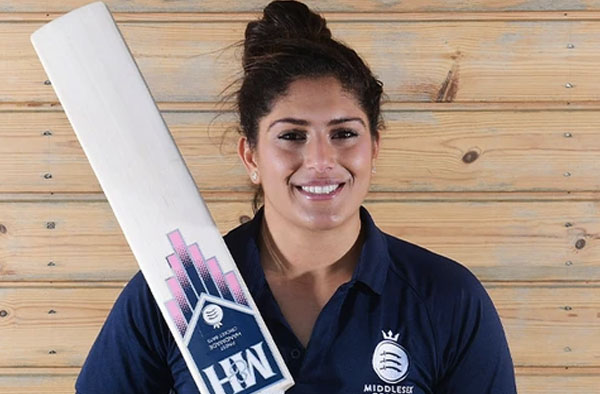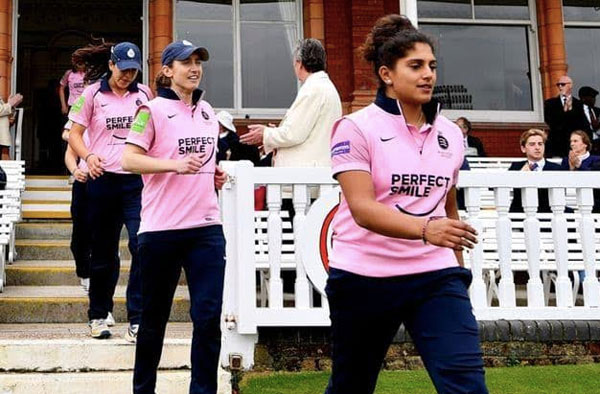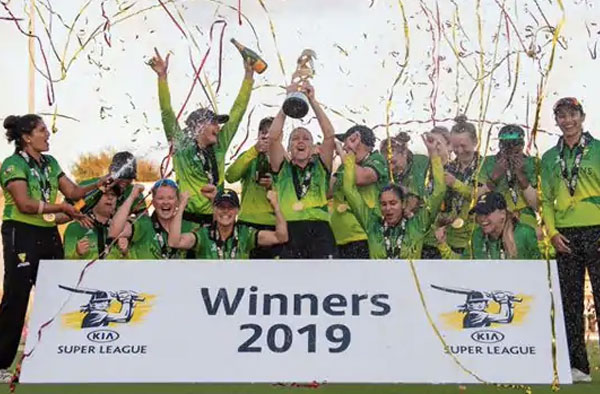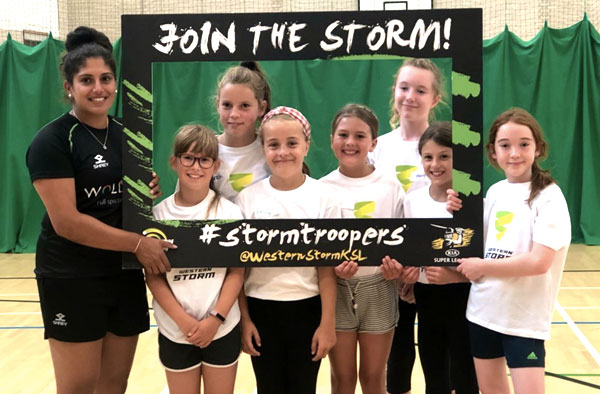Naomi Dilip Dattani, born on 28th April 1994, a cricketer of India origin who currently plays for Middlesex county dons several hats. Apart from playing, Naomi has a vast experience in coaching kids. She worked with Twyford CofE Academic Trust before venturing out on her personal project called Naomi Dattani Coaching Services. Naomi has played with Western Storm and Surrey Stars in England’s domestic tournament – Kia Super League.
Her side Western Storm went on to win the 2019 edition of Kia Super League. There’s more to her prodigious journey. What Naomi has achieved at this young age is just incredible and goes a long way in encouraging more Asian girls to take up this sport.

Excerpts from the interview
1. A person of Indian origin captaining an English county team, how does that feel?
At the time, it was just a great opportunity to take and develop myself as an individual and build on my confidence to lead a team. I was nervous and excited about what opportunities lied ahead. When I told my parents, they both made a comment asking ‘are you the first Asian county captain for Middlesex?’ I wasn’t sure, but I knew then that this was an achievement, and I represented a role model for many young South Asian girls in the sport.
2. Going back to your childhood, at what age did you start playing cricket?
I started playing in the back garden with my older brother, trying to avoid breaking plants and pots! We would come up with many different games and challenges, and I just loved it. My family then found a local boy’s cricket club, Perivale; that I joined at the age of 9 years old. That was the first time I experienced hardball games, pads, and being competitive.

3. Who was your inspiration back then?
At the time, cricket was just a hobby, and I just loved being outside, meeting new people, and challenging myself. I would say I am a bit of a perfectionist, or just wanted to complete something that was in front of me. At the time that was the biggest inspiration, until I went on a school trip to watch England women play a game. I never knew you could get to such a level, and there on I just wanted to keep playing and get involved as much as I could, which is no different today. Inspiration for me comes from many different people, parents, friends, and any environment I put myself in.
4. Did you always want to become an all-rounder?
Originally, most of my early success was as a left-arm pace bowler. I made my senior Middlesex debut at 14 as a bowler against Warwickshire. As years went by after, I started to realize that batting was a weakness and required more hours of effort. Through my first trip to Melbourne, was arguably the first time I dedicated most of my training hours to batting, and I loved the new challenge. 5 years later today, I have managed to marry the two skills together and find a balance I am comfortable with, where I enjoy training both skills equally, and realize being an all-rounder is more my type of role in teams.
5. What does it take to be a good all-rounder?
Just like any skill, it requires a balance in the way you train, and organize your time. Some weeks I focus more attention to batting, and that’s maybe because I have more hours to catch up on, but some weeks I get the bowling bug. As long as I have factored both skills into my week, then I know this will help improvements on both skills. When playing as an all-rounder, you sometimes have to adapt quite quickly to the stage of the game. Deciding between rebuilding a partnership, or being explosive towards the end of a game, and for bowling, do we need wickets or do we need to restrict boundaries and bowl more at the death. All tactics cross over, but being able to adapt quickly would make you a good all-rounder.
6. You have studied BSc. Sport & Exercise Science, could you tell us how it has helped you in the game practically?
Studying sport science, allowed me to understand why we train in the way we do. When it comes to strength and conditioning, the way a coach delivers the task, and the psychology of working in a team successfully. I have always been someone who wanted to know why therefore this degree gave me the answers. Understanding how the body moves and operates, I started to be more aware of what my body does whilst bowling. Fast bowling has so many factors, and using this knowledge I tried to understand how, strength, mobility, flexibility, coordination, and mental skills all came together to achieve pace. It is always a work in progress and forever learning, but I love making these connections.

7. You played your first county game when you were just 14. Did you think that you would make your county debut at such a young age?
Looking back, I didn’t realize how young I was, and how significant it was playing for the senior team so young. I followed the pathway, I challenged myself to always get better, and before I knew it, the opportunity came. I think having that mentality at the time and ‘going with the flow’ was a big strength, I worried less about everything else and just enjoyed what I was doing and the experiences that I had. Now I can look back, and think that certainly was an achievement.
8. Your county success was recognized at the national level when you got a chance to play in Kia Super League. How did you feel?
I haven’t told this story to many, but I feel that year was a whirlwind and really significant. 2016, I came back from Melbourne having invested 6 months of training, mostly batting and nothing else. I went from batting at 8 for Middlesex, to open the batting based on a spot becoming available. Many teammates commented on such a big change, and it led me to score 72, my highest score. As this season went on, I currently had no KSL team. Through opportunities playing with the Academy, and nearing the KSL season, an opportunity became available to play for Surrey Stars having already missed the first week of training. It was such an exciting moment, and I couldn’t wait to get going! Little did I know, I was going to play some games that year too. That year gave me a lot of confidence in my skills, and what I could achieve. Playing for Surrey Stars and being part of a more professional set up ignited me to do more.
9. You have played for Western Storm as well as Surrey Stars in Kia Super League. How was the experience different from both the teams?
Having played for both teams, it was really interesting to experience two types of coaching and social setups. As a player, I learned a lot from both camps and enjoyed my time with the girls. However, spending time away from home in the West country brought about a slightly different experience, and engaging with new players I’d only ever played against. Personally, I felt myself being more myself in the environment, which in turn allowed my cricket skills to shine even more. The fact that most stayed together in one place at Exeter University helped us bond off the field more, which helped the trust for one another on the pitch. I learned different things from two different camps.
10. You were also signed up by London Spirit to play the Hundred. What was your reaction when you got this offer?
This whole process was exciting, having just won the KSL 2019 Finals day with Western Storm, the excitement of the 100 began almost straight away. I was thrilled to be offered a contract back at my home town to play franchise cricket, so when I signed, I could not wait to have the chance to play at Lord’s!

11. How is it playing and coaching the same sport? When did you decide to become a cricket coach?
Cricket coaching came about quite organically from the age of 16. It was a flexible job that I could have around training. For a long time, coaching really helped me understand my own game, as I could test out new drills on myself before helping others. As time went on, one to one coaching became something I’d love. Having the chance to give back and share my own cricket experiences with younger girls and boys. More recently, whilst cricket playing commitments have increased, I’ve found coaching cricket more difficult as I can’t switch off. It has been a new learning curve but keen to find the right balance.
12. Since January 2019, you have been coaching in Naomi Dattani Coaching Services. Tell us about your experience.
So, this is a new venture; future planning. I still work at various cricket clubs as an independent coach; however, this business will encapsulate cricket, personal training, and mentoring, which will all intertwine together. This was set to be built up this summer but currently on hold during this pandemic. My coaching will gear towards supporting young athletes as a whole well-rounded individual rather than just one skill. I am really looking forward to building this brand and find my niche.
13. Prior to starting your own academy, you were a sports coach at Twyford CofE Academic Trust, a cricket coach at Activate Sports as well as Cricket Victoria. How has the coaching experience helped you in starting your own academy?
Although my own personal coaching services have not begun on a bigger scale just yet, having experienced many different coaching settings has really set me up to build my own opinions and methods on ways to get the best out of an individual. I am always learning, by challenging my comfort zones in the coaching, psychological and fitness worlds, which all will come together to help build my own academy in the future.
So excited for this! Can’t wait to get going with London Spirit 😍 💯🔥#thehundred pic.twitter.com/7HgLFcoqJh
— Naomi Dattani (@NaomiDattani) January 22, 2020
14. Since you had a short stint as a coach with Australia’s Junior Pathways team, can you tell us how is Australian cricket different from English cricket?
I worked with the pathways with Cricket Victoria, where I coached the u18s and u15s girls’ teams in their summer regional competition used for state selection. This was really interesting to see how young girls in Melbourne compared to England use their opportunity. I would argue there was more competition at the younger level in Melbourne because cricket would be the main sport, they play in the summer compared to England where girls have various options, and previously played rounders at school. Now that this is changing, young girls in England now are becoming more competitive at different levels of the pathway.
15. This year you received the Asian Women of Achievement award. How does that feel?
In 2019, I was shortlisted for the Sports Award at the Asian Women Awards. As mentioned before, I didn’t realize the position I was in as a British Indian sportswoman, so becoming recognized for this was a huge honor. At the awards, and being amongst so many inspiring Asian women in different fields, I sat there and thought this is incredible, and there are so many women pushing boundaries. From there on, this last year I have used this platform to inspire more Asian girls to take up the sport. It makes me feel very proud of where I come from, and how much more there is to be done.

16. Recently, you also shared some fielding drills challenges on the internet. According to you, how important is fielding, and how have the standards of fielding changed over the years?
Fielding is now one of the most important skills to have. I was told from very early on, that if a coach has to pick between two of the same players, then it would be decided on who is better at fielding. Over the years, fitness has become so important in the game to be able to execute a high level of skills for a long period of time. I think, if you can be a great fielder, then you will be able to take catches you thought you couldn’t and dive on the boundary, all things that could change the game and put you in winning positions, and that generally is the difference at the top level between two teams.
17. Now that the Hundred has been postponed to 2021, how do you see the cricket season progressing after the lockdown?
It is a tough time for everyone and those in sport. Most of us are hoping there will be some cricket in September, but the main thing is staying safe and protecting others. Things are always changing, so I presume if all goes ok, we will resume another winter, and prepare as normal for next season depending on guidelines. Many are staying positive, especially in the women’s game as this is a really important time to keep some momentum going so we would love to get out there to help the momentum into 2021.

Loves all things female cricket